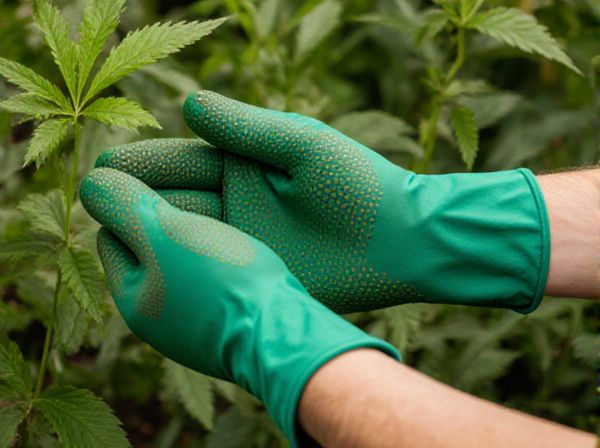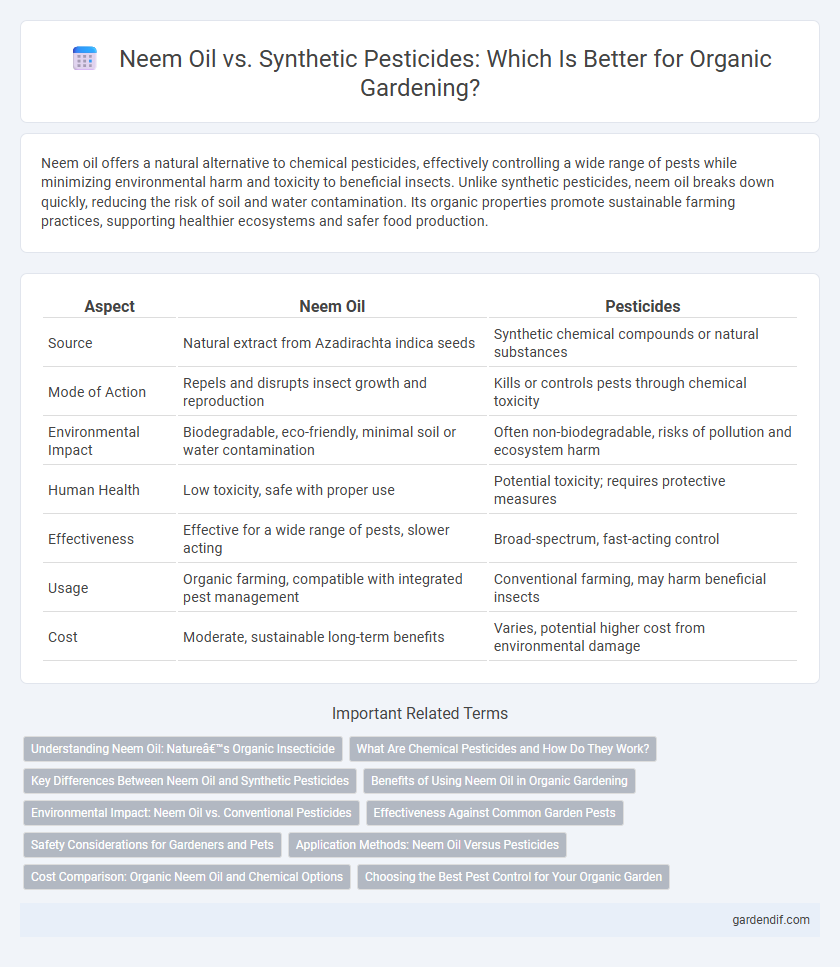
Neem oil vs Pesticides Illustration
Neem oil offers a natural alternative to chemical pesticides, effectively controlling a wide range of pests while minimizing environmental harm and toxicity to beneficial insects. Unlike synthetic pesticides, neem oil breaks down quickly, reducing the risk of soil and water contamination. Its organic properties promote sustainable farming practices, supporting healthier ecosystems and safer food production.
Table of Comparison
| Aspect | Neem Oil | Pesticides |
|---|---|---|
| Source | Natural extract from Azadirachta indica seeds | Synthetic chemical compounds or natural substances |
| Mode of Action | Repels and disrupts insect growth and reproduction | Kills or controls pests through chemical toxicity |
| Environmental Impact | Biodegradable, eco-friendly, minimal soil or water contamination | Often non-biodegradable, risks of pollution and ecosystem harm |
| Human Health | Low toxicity, safe with proper use | Potential toxicity; requires protective measures |
| Effectiveness | Effective for a wide range of pests, slower acting | Broad-spectrum, fast-acting control |
| Usage | Organic farming, compatible with integrated pest management | Conventional farming, may harm beneficial insects |
| Cost | Moderate, sustainable long-term benefits | Varies, potential higher cost from environmental damage |
Understanding Neem Oil: Nature’s Organic Insecticide
Neem oil, derived from the seeds of the Azadirachta indica tree, serves as a powerful organic insecticide by disrupting the hormonal systems of pests, preventing their growth and reproduction. Unlike synthetic pesticides, neem oil is biodegradable, non-toxic to beneficial insects like bees and ladybugs, and poses minimal environmental hazards. Its broad-spectrum efficacy against aphids, whiteflies, and caterpillars makes neem oil a sustainable choice for integrated pest management in organic farming.
What Are Chemical Pesticides and How Do They Work?
Chemical pesticides are synthetic substances designed to eliminate or control pests by targeting their nervous system, growth processes, or cellular functions. These compounds, such as organophosphates and carbamates, disrupt essential biological mechanisms in insects and weeds, leading to paralysis or death. Their widespread use in agriculture raises concerns about environmental toxicity, pest resistance, and impacts on non-target organisms.
Key Differences Between Neem Oil and Synthetic Pesticides
Neem oil is a natural insecticide derived from the seeds of the Azadirachta indica tree, containing active compounds like azadirachtin that disrupt insect growth and reproduction while posing minimal risk to beneficial insects and soil health. Synthetic pesticides often contain chemical compounds designed for rapid pest eradication but can cause environmental contamination, pest resistance, and harm to non-target organisms. Neem oil's biodegradability and low toxicity make it a preferred choice in organic farming systems aiming for sustainable pest management and reduced ecological impact.
Benefits of Using Neem Oil in Organic Gardening
Neem oil offers a natural, eco-friendly alternative to chemical pesticides, reducing harmful residues in organic gardening. Its bioactive compounds target a broad spectrum of pests while promoting beneficial insect populations, enhancing garden biodiversity. Using neem oil supports sustainable crop health by breaking pest life cycles without contaminating soil or water sources.
Environmental Impact: Neem Oil vs. Conventional Pesticides
Neem oil offers a significantly lower environmental impact compared to conventional pesticides, as it is biodegradable and targets pests without harming beneficial insects or soil microorganisms. Conventional chemical pesticides often persist in the environment, contaminating water sources and disrupting ecosystems. The use of neem oil supports sustainable agriculture by reducing chemical residues and promoting biodiversity preservation.
Effectiveness Against Common Garden Pests
Neem oil effectively targets a wide range of common garden pests such as aphids, whiteflies, and spider mites by disrupting their feeding and reproductive cycles. Its natural, biodegradable properties minimize environmental harm compared to synthetic pesticides, which often cause resistance and harm beneficial insects. Regular neem oil applications promote sustainable pest control by maintaining garden ecosystem balance while preventing pest resurgence.
Safety Considerations for Gardeners and Pets
Neem oil offers a safer alternative to traditional chemical pesticides by being non-toxic to humans, pets, and beneficial insects when used as directed. Unlike many synthetic pesticides that can cause skin irritation, respiratory problems, or toxic exposure to pets, neem oil is biodegradable and breaks down quickly in the environment. Gardeners should still follow proper application guidelines to avoid potential plant sensitivity while ensuring a pet-safe gardening space.
Application Methods: Neem Oil Versus Pesticides
Neem oil is commonly applied as a foliar spray or soil drench, offering targeted pest control with minimal environmental impact by disrupting insect feeding and reproduction. Pesticides typically use spray, dust, or granule methods, often affecting a broader range of organisms and potentially leading to chemical runoff or resistance. The controlled application of neem oil supports sustainable agriculture by maintaining beneficial insect populations and reducing chemical residues in soil and water.
Cost Comparison: Organic Neem Oil and Chemical Options
Neem oil offers a cost-effective alternative to chemical pesticides, with prices typically ranging from $10 to $20 per liter, depending on purity and brand. Chemical pesticides, though often cheaper upfront at $5 to $15 per liter, can incur higher long-term costs due to environmental damage and pest resistance. Organic neem oil provides sustainable pest control benefits, reducing the need for frequent applications and lowering overall expenditure for farmers committed to eco-friendly practices.
Choosing the Best Pest Control for Your Organic Garden
Neem oil offers a natural, biodegradable solution that targets a wide range of garden pests without harming beneficial insects or soil health, making it ideal for organic gardening. Chemical pesticides, while effective, often leave harmful residues that disrupt the ecosystem and can lead to pest resistance over time. Opting for neem oil supports sustainable pest control practices, preserves organic certification, and maintains biodiversity in your garden environment.
Neem oil vs Pesticides Infographic

 gardendif.com
gardendif.com